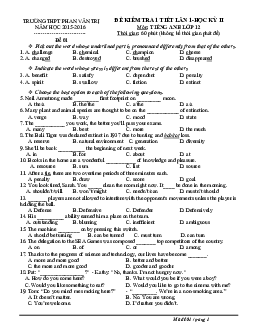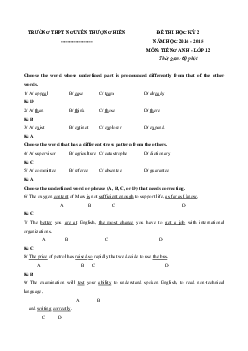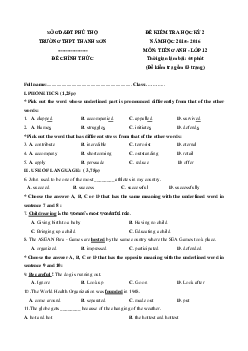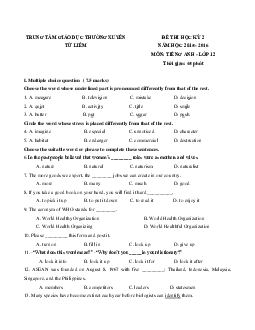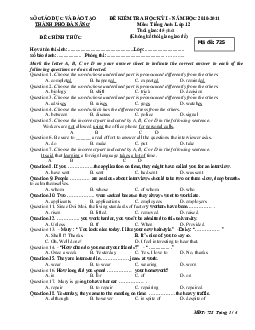







Preview text:
ĐỀ THI CUỐI HỌC KÌ 2 MÔN TIẾNG ANH LỚP 12
NĂM HỌC 2018 – 2019
Mark the letter A, B, C, or D on your answer sheet to indicate the correct answer to
each of the following questions.
Question 1: ........, the athlete broke the world's record in his second attempt. A. Surprise B. Surprised C. Surprising D. Surprisingly
Question 2: As soon as I........my report, I'll call you and we'll go to dinner. A. will finish B. finish C. finished D. had finished
Question 3: The International Red Cross has about 97 million volunteers whose main.....is
to protect human life and health. A. rule B. experience C. organization D. mission
Question 4: The 22nd SEA Games consisted of athletes from eleven.....countries.
A. participate B. participating
C. participation D. participant
Question 5: Credit cards.....in international trade are very convenient. A. used B. using C. which used D. use
Question 6: The government hopes to........its plans for introducing cable TV. A. carry out B. turn out C carry on D. keep on
Question 7: UNESCO was established to encourage.......among nations in the areas of
education, science, culture, and communication. A. employment
B. collaboration C. workforce D. independence
Question 8: The authority has postponed......the flyover because it severely affects residents nearby. A. building B. to build C. to building D. build
Question 9: It isn't cold outside. You.......wear a coat. A. may B. mustn't C. should D. needn't
Question 10: The lake........from our bedroom window. A. can see B. could see
C. can be seen D. could been seen
Question 11: I was feeling tired last night, so I went to bed........usual. A. as early than
B. more early than C. earlier than D. as early as
Question 12: We shouldn't go out; the weather is getting........ A. more and more bad B. worse and worse C. bad and worse D. worst and worst
Question 13: Humans depend on species diversity to have food, clean air and water and
fertile soil .......agriculture. A. in B. for C. about D. with
Question 14: The primary causes orspecies extinction are........destruction, commercial exploitation and pollution. A. reserve B. generation C. habitat D. diversity
Mark the letter A, B, C, or D on your answer sheet to indicate the word whose
underlined part differs from the other three in pronunciation in each of the following questions.
Question 15: A. accountant B. amount
C. foundation D. country
Question 16: A. appealed B. booked C. aimed D. played
Mark the letter A, B, C, or D on your answer sheet to indicate the word(s) OPPOSITE
in meaning to the underlined word(s) in each of the following questions.
Question 17: In the second game, her opponent hurt her leg and had to retire. A. defender B. rival C. referee D. teammate
Question 18: Polluted water and increased water temperatures have driven many species to the verge of extinction. A. enriched B. contaminated C. purified D. strengthened
Read the following passage and mark the letter A, B, C, or D on your answer sheet to
indicate the correct word or phrase that best fits each of the numbered blanks from 19 to 23.
Any change in one part of an ecosystem can cause changes in other parts. Droughts,
storms and fires can change ecosystems. Some changes (19).......ecosystems. If there is too
little rainfall, plants will not have enough water to live. If a kind of plant dies off, the
animals (20)......feed on it may also die or move away. Some changes are good for
ecosystems. Some pine forests need fires for the pine trees to reproduce. The seeds are
sealed inside pinecones. Heat from a forest fire melts the seal and lets the seeds (21) .
Polluting the air, soil, and water can harm ecosystems. Building (22).......on rivers for
electric power and irrigation can harm ecosystems around the rivers. Bulldozing wetlands
and cutting down forests destroy ecosystems. Ecologists are working with companies and
governments to find better ways of (23) ...... fish, cutting down trees, and building reservoirs. They are looking for
ways to get food, lumber, and other products for people without causing harm to ecosystems. Question 19: A. harms B. harmful C. harmless D. harm Question 20: A. who B. where C. that D. when Question 21: A. out B. in C. go D. fly Question 22: A. moats B. dams C. ditches D. bridges
Question 23: A. catching B. holding C. carrying D. taking
Read the following passage and mark the letter A, B, C or D on your answer sheet to
indicate the correct answer to each of the questions from 24 to 31.
The issue of equality for women in British society first attracted national attention in the
early 20th century, when the suffragettes won for women the right to vote. In the 1960s
feminism became the subject of intense debate when the women's liberation movement
encouraged women to reject their traditional supporting role and to demand equal status and
equal rights with men in areas such as employment and pay.
Since then, the gender gap between the sexes has, been reduced. The Equal Pay Act of
1970, for instance, made it illegal for women to be paid less than men for doing the same
work, and in 1975 the Sex Discrimination Act aimed to prevent either sex having an unfair
advantage when applying for jobs. In the same year, the Equal Opportunities Commission
was set up to help people claim their rights to equal treatment and to publish research and
statistics to show where improvements in opportunities for women need to be made. Women
now have much better employment opportunities. Though they still tend to get less well-paid
jobs than men, and very few are appointed to top jobs in industry.
In the US, the movement that is often called the "first wave of feminism" began in the mid-
1800s. Susan B. Anthony worked for the right to vote. Margaret Sanger wanted to provide
women with the means of contraception so that they could decide whether or not to have
children, and Elizabeth Blackwell, who had to fight for the chance to become a doctor,
wanted women to have greater opportunities to study. Many feminists were interested in other social issues.
The second wave of feminism began in 1960s. Women like Betty Friedan and Gloria
Steinem became associated with the right to get equal rights and opportunities for women
under the law. An important issue was the Equal Rights Amendment (ERA), which was
intended to change the Constitution. Although the ERA was not passed, there was progress
in other areas. It became illegal for employers, schools, clubs, etc. to discriminate against
women. But women still find it hard to advance beyond a certain point in their careers, the
co-called glass ceiling that prevents them from having high-level jobs. Many women also
face the problem of the second shift, i.e. the household chores.
In 1980s, feminism became less popular in the US and there was less interest in solving the
remaining problems, such as the fact that most women still earn much less than men.
Although there is still discrimination, the principle that it should not exist is widely accepted.
Question 24: It can be inferred from paragraph 1 that in the 19th century,..........
A. British women did not have the right to vote in political elections
B. most women did not wish to have equal status and equal rights
C. British women did not complete their traditional supporting role
D. suffragettes fought for the equal employment and equal pay.
Question 25: The phrase "gender gap" in paragraph 2 refers to...........
A. the social distance between the two sexes
B. the difference in status between men and women
C. the visible space between men and women
D. the social relationship between the two sexes
Question 26: Susan B. Anthony, Margaret Sanger, and Elizabeth Blackwell are mentioned as........
A. American women who had greater opportunities
B. pioneers in the fight for American women's rights
C. American women where were more successful than men
D. American women with exceptional abilities
Question 27: The Equal Rights Amendment (ERA)…....
A. was not officially approved B. was brought into force in 1960s
C. supported employers, schools, and clubs
D. changed the US Constitution
Question 28: Which of the following is TRUE according to the passage?
A. The US movement of feminism became the most popular in the late 20th century.
B. The women's liberation movement in the world first began in Britain.
C. The movement of feminism began in the US earlier than in Britain.
D. The British government passed laws to support women in the early 20th century.
Question 29: The phrase "glass ceiling" in paragraph 4 mostly means........... A. an overlooked problem B. a ceiling made of glass
C. an imaginary barrier D. a transparent frame
Question 30: Which of the following is not mentioned in the passage?
A. Many American women still face the problem of household chores.
B. An American women once had to fight for the chance to become a doctor.
C. British women now have much better .employment opportunities.
D. There is now no sex discrimination in Britain and in the US.
Question 31: Which of the following would be the best title for the passage?
A. Women and the Rights to vote B. Opportunities for Women Nowadays
C. The Suffragettes in British Society D. Feminism in Britain and the US
Mark the letter A, B, C, or D on your answer sheet to indicate the sentence that is
closest in meaning to each of the following questions.
Question 32: You're the worst guitarist in the world.
A. No one in the world plays the guitar as well as you.
B. No one in the world play the guitar as bad as you.
C. No one in the world plays the guitar as badly as you.
D. No one plays guitar as badly as you in the world.
Question 33: My impression of him was that he was a very capable person.
A. I struck him with the impression that he was very capable.
B. It struck me as an impression that he was a very capable person.
C. He struck me when I was impressed by his capability.
D. He struck me as being a very capable person.
Question 34: "I was not there at the time," he said.
A. He denied to have been there at the time.
B. He denied that he had not been there at the time.
C. He denied to be there at the time.
D. He denied having been there at the time.
Mark the letter A, B, C, or D on your answer sheet to indicate the word that differs
from the other three in the position of primary stress in each of the following questions.
Question 35: A. survive B. defend C. swallow D. appeal
Question 36: A. tsunami B. penalty C. wilderness D. podium
Mark the letter A, B, C, or D on your answer sheet to indicate the word(s) CLOSEST
in meaning to the underlined word(s) in each of the following questions.
Question 37: Once in a while I visit my grandparents on the farm and stay there for some days. A. Regularly
B. Sometimes C. Usually D. Rarely
Question 38: It is automobiles that provide millions of people with transportation. A. supply B. submit C. bring D. cause
Mark the letter A, B, C, or D on your answer sheet to indicate the option that best
completes each of the following exchanges,
Question 39: Laura is telling Bob about her exam results.
~ Laura: "..............."
~ Bob: "That's great. Congratulations!"
A. I've passed the exam with an A.
C. I'll get the exam results tomorrow.
B. I hope I'll pass the exam tomorrow.
D. I didn't do well in the exam
Question 40: ~ Jack: "Would you like a biscuit?"
~ Mary: "................. . I'm on a diet."
A. Yes, please B. Yes, thank you C. No, thanks D. It's OK
Read the following passage and mark the letter A, B, C or D on your answer sheet to
indicate the correct answer to each of the questions from 41 to 45.
Langston Hughes was one of the greatest American writers of the 20th century. He was
born in Joplin, Missouri, and moved to Cleveland at the age of 14. Several years later, he
spent one year in Mexico before attending Columbia University in New York. For a few
years after that, he roamed the world as a seaman, visiting ports around the world and
writing some poetry. He returned to the United States and attended Lincoln University,
where he won the Witter Bynner Prize for undergraduate poetry. After graduating in 1928,
he travelled to Spain and to Russia with the help of a Guggenheim fellowship. His novels
include Not without Laughter (1930) and The Big Sea (1940). He wrote an autobiography in
1956 and also published several collections of poetry. The collections include The Weary
Blues (1926), The Dream Keeper (1932), Shakespeare in Harlem (1942), Fields of Wonder
(1947), One Way Ticket (1947), and Selected Poems (1959). A man of many talents, Hughes
was also a lyricist, librettist, and a journalist. As an older man in the 1960s, he spent much of
his time collecting poems from Africa and from African-Americans to popularize black
writers. Hughes is one of the most accomplished writers in American literary history, and he
is seen as one of the artistic leaders of the Harlem Renaissance, the period when a
neighbourhood that was predominantly black produced a flood of great literature, music, and
other art forms depicting daily city life for African-Americans.
Question: 41: What is the main topic of this passage?
A. The life of Langston Hughes B. The Harlem Renaissance
C. African-American writers D. American twentieth-century writers
Question 42: Where was Langston Hughes born? A. Spain B. New York C. Missouri D. North Carolina
Question 43: According to the author, what did Hughes do during the later years of his life? A. He wrote short stories.
B. He popularized African-American writers.
C. He advocated racial equality. D. He wrote about life in Harlem.
Question 44: Which of the following can best substitute for the word "depicting" in the passage?
A. congratulating B. blessing C. screening D. portraying
Question 45: According to the passage, Langston Hughes was all of the following except........... A. a novelist B. a poet
C. a historian D. a journalist
Mark the letter A, B, C, or D on your answer sheet to indicate the underlined part that
needs correction in each of the following'questions.
Question 46: Nam (A) asked Mai what (B) can he do (C) to help (D) her. [he could ]
Question 47: (A) The oldest the children (B) are, the (C) more their parents (D) expect from them. [The older…]
Question 48: (A) The Homestead Act of 1862 granted 160 acres of land (B) for any settler
who (C) would spend five years (D) on the land. [grant sth. to sb.]
Mark the letter A, B, C, or D on your answer sheet to indicate the sentence that best
combines each pair of sentences in the following questions.
Question 49: We started out for California. It started to rain right after that.
A. No sooner did we start out for California than it started to rain.
B. No sooner had we started out for California when it started to rain.
C. No sooner had it started to rain than we started out for California.
D. No sooner had we started out for California than it started to rain.
Question 50: He didn't take his father's advice; that's why he was out of work.
A. If he had taken his father's advice, he would not have been out of work.
B. If he took his father's advice, he would not be out of work.
C. If he had taken his father's advice, he would not be out of work.
D. If he takes his father's advice, he will not be out of work. Answer Key 1 D 11 C 21 A 31 D 41 A 2 B 12 B 22 B 32 C 42 C 3 D 13 B 23 A 33 B 43 A 4 B 14 C 24 A 34 D 44 D 5 A 15 D 25 A 35 C 45 C 6 A 16 B 26 B 36 A 46 B 7 B 17 D 27 A 37 B 47 A 8 A 18 C 28 C 38 A 48 B 9 D 19 D 29 C 39 A 49 D 10 C 20 C 30 D 40 C 50 A
